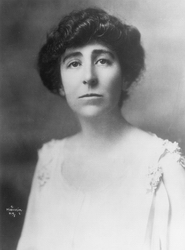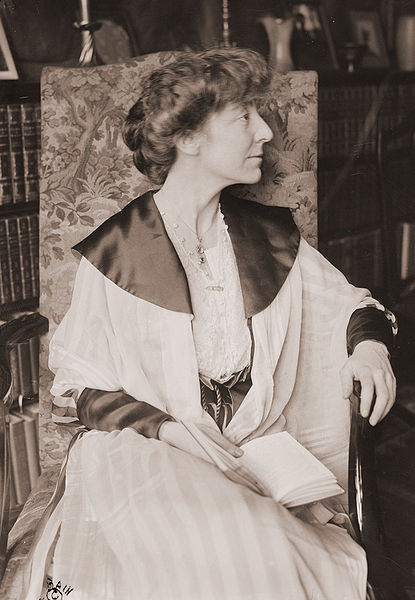<Back to Index>
- Engineer David Bernard Steinman, 1886
- Composer Richard Georg Strauss, 1864
- Member of Congress Jeannette Pickering Rankin, 1880


Jeannette Pickering Rankin (June 11, 1880 – May 18, 1973) was the first woman to be elected to the United States House of Representatives and the first female member of the Congress sometimes referred to as the Lady of the House. A lifelong pacifist, she voted against the entry of the United States into both World War I and World War II, the only member of Congress to vote against the latter. To date, she is the only woman to be elected to Congress from Montana.
Born in Missoula, Montana on June 11, 1880, Rankin was the first of seven children of Canadian immigrant John Rankin, a rancher and lumber merchant, and Olive Rankin (née Pickering), a former school teacher originally from New England. She attended the University of Montana and graduated in 1902 with a bachelor of science degree in biology.
In
1908, she migrated to New York City, where she started a career as a
social worker. She later moved to Seattle, Washington, and then
enrolled at the University of Washington, where she joined the incipient suffrage cause.
She was instrumental in the cause's efforts to enable women to vote in
Montana, and women gained the vote in Montana in 1914. On November 7, 1916 she was elected to the House of Representatives as a Republican from Montana, becoming the first female member of Congress. The Nineteenth Amendment (which
gave women the right to vote everywhere in the United States) was not
ratified until 1920; therefore, during Rankin's first term in Congress
(1917–1919), many women throughout the country did not have the right
to vote, though they did in her home state of Montana. On April 6, 1917, only four days into her term, the House voted on the resolution to enter World War I. Rankin cast one of 50 votes
against the resolution, earning her immediate vilification by the
press. Suffrage groups canceled her speaking engagements. Despite her
vote against entering the war, she devoted herself to selling Liberty Bonds and voted for the military draft. In 1918, she ran an unsuccessful campaign for the Republican nomination to represent Montana in the United States Senate. She then ran an independent candidacy, which also failed. Her term as Representative ended early in 1919. For the next two decades, she worked as a lobbyist in Washington, D.C. for various causes. In
1918, and again in 1919, she introduced legislation to provide state
and federal funds for health clinics, midwife education, and visiting
nurse programs in an effort to reduce the nation's infant mortality.
While serving as a field secretary for the National Consumers' League,
she campaigned for legislation to promote maternal and child health
care. As a lobbyist, Rankin argued for passage of the Sheppard-Towner Act,
an infant and maternal health bill which was the first federal social
welfare program created explicitly for women and children. The
legislation, however, was not enacted until 1921 and was repealed just
eight years later. She was founding Vice-President of the American Civil Liberties Union and a founding member of the Women's International League for Peace and Freedom. In 1940, Rankin was again elected to Congress, this time on an anti-war platform. Following the attack on Pearl Harbor,
she once again voted against entering a World War, the only member of
Congress to do so, saying "As a woman, I can't go to war and I refuse
to send anyone else. It is not necessary. I vote NO." Montana
Republican leaders demanded that Rankin change her vote, but she
refused. However she did not vote against declaring war on Germany and Italy following their declaration of war on the U.S. Instead, she voted merely Present. By 1942, Rankin's antiwar stance had become so unpopular that she did not seek re-election. During the remainder of her life, she traveled to India seven times and was a devotee of Gandhian principles of non-violence and self-determination. Rankin was actively opposed to U.S. military action in the Vietnam War.
In 1968 she led a protest demonstration of thousands of women in
Washington, D.C. The following year she participated in other antiwar
marches in Georgia and South Carolina.
Rankin died in Carmel, California at the age of 92 from natural causes. Rankin bequeathed her property in Watkinsville, Georgia to help "mature, unemployed women workers." This was the seed money for the Jeannette Rankin Foundation, a 501(c)(3) organization that gives educational scholarships annually to low income women all
across the United States. The organization has built capacity since its
single $500 scholarship in 1978 to the eighty $2000 scholarships it is
awarding in 2007. In 1985, a statue of her was placed in the United
States Capitol's Statuary Hall. A play based on the life of Rankin entitled A Single Woman was produced in 2004, and a film of the same name was made in 2008.